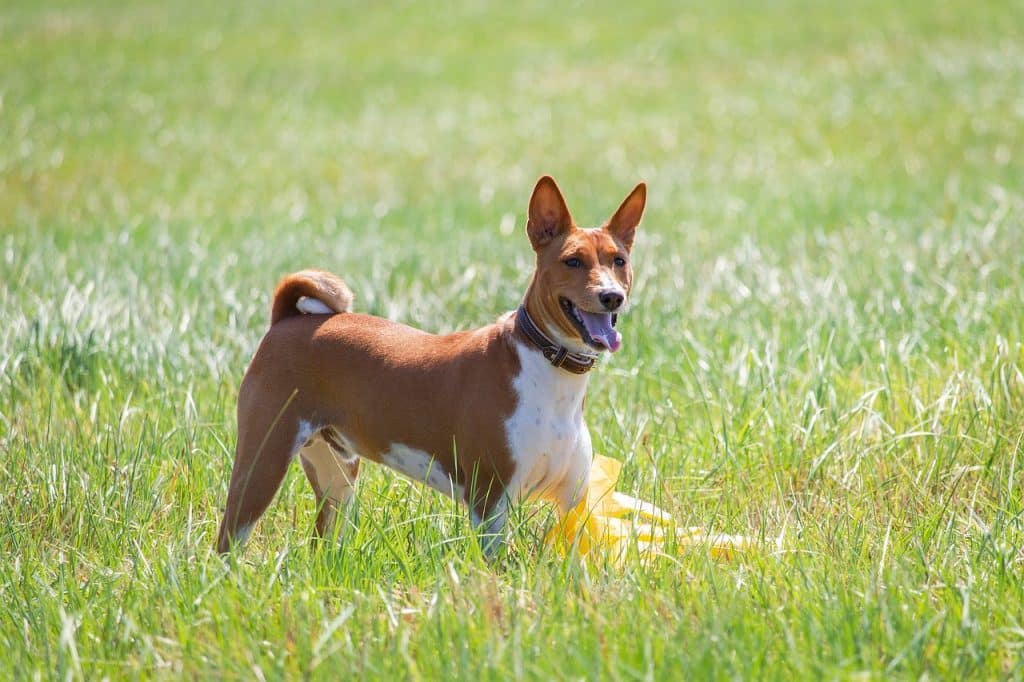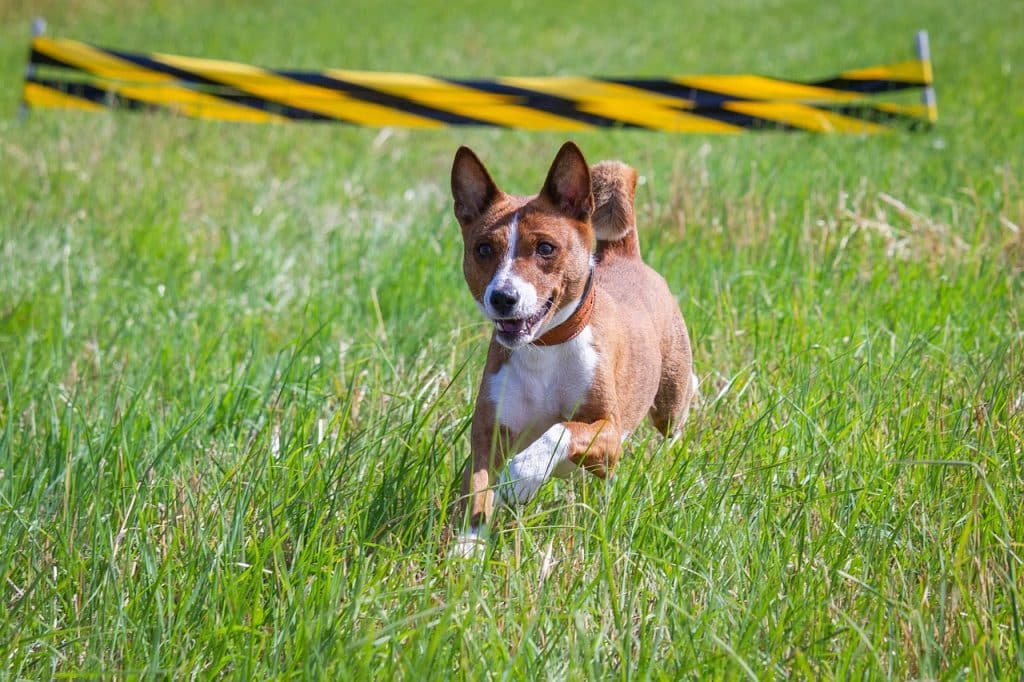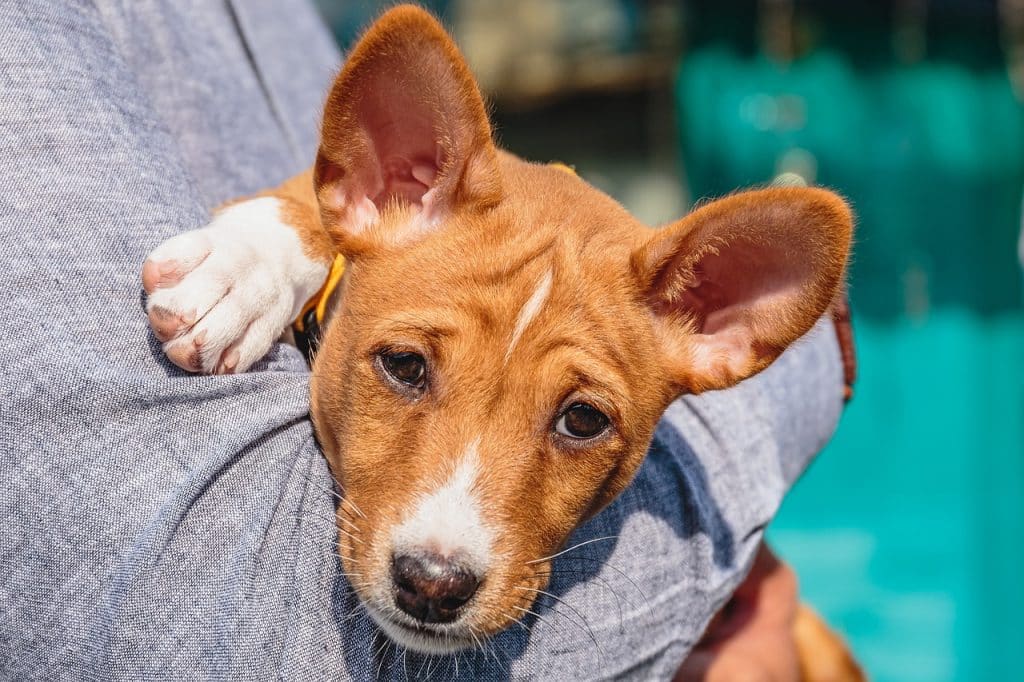
Basenjis are often described as having a “cat-like personality” because of their grooming habits, and also for their independent thinking. Basenjis, just like cats, love to climb to the highest point they can reach, even if it is over a fence that was meant to contain them. Check the height of the fence in your backyard and learn more about this breed before you adopt or buy one.
Breed Overview
Colors:
Red and white and black, or black and tan with white.
Compatible with:
Families or individuals who are looking for an intelligent, independent, and energetic breed that does not shed nor bark
Temperament:
Independent, smart, poised, mischievous, aloof, “cat-like”
Basenjis, which originated in ancient Africa, are called “barkless dogs” due to the unique way they vocalize. The Basenji is the smallest hound, but their small size should not fool you. Behind their cute faces, this breed is full of personality and energy.
Basenji Characteristics
Energy:
Low-energy dogs need minimal physical activity, while high-energy dogs are in need of a lot of mental and physical stimulation. When choosing a puppy, it’s crucial to ensure that their energy level matches your lifestyle.
Trainability:
Dogs that are easy to train learn prompts and actions more quickly, with less training. Dogs who are more difficult to train require a little bit of patience and practice.
Health:
Some breeds of dogs are more susceptible to genetic problems than others. It doesn’t necessarily mean that all dogs will suffer from these problems, but some are more susceptible than others.
Lifespan:
Some breeds have shorter life expectancies than others, either because of their size or genetic issues. The lifespan of your dog is also affected by proper exercise, nutrition, and hygiene.
Sociability:
Some dog breeds have a more social disposition, towards both humans and dogs. Social dogs are more likely to approach strangers and ask for a pet or a scratch, while less-social dogs tend to be more reserved and cautious. It’s important that you socialize with your dog, regardless of the breed.
Basenji Puppies
Look for breeders who are responsible. Responsible breeders ensure that the parents of their puppies are healthy, and have no inherited diseases. They will ensure that their puppies receive the appropriate vaccinations and dewormers, as well as a vet check. You can ask your vet or local Basenji dog owners for recommendations.

Basenjis are intelligent and independent and have a “cat-like behavior”. Basenjis are a rare breed of dog because they don’t shed much and tend not to bark.
Temperament & intelligence of the Basenji
Basenjis tend to be active and curious. Basenjis are friendly and affectionate with their owners, but they can be wary of strangers. Basenjis can be overly protective, so it is important to socialize them early.
Basenjis can be very clever, but sometimes they are too smart for themselves. Basenjis are very intelligent and will often find a way to amuse themselves if bored. This can lead to a lot more trouble. Basenjis are intelligent but can be difficult to train due to their stubbornness and tendency for boredom. When training this breed, patience, creativity, and lots of positive reinforcement are needed.
What breeds are good for families?
Basenjis have a high level of energy, making them a great breed for families with active lifestyles. Basenjis are good with children when properly socialized. Basenjis are dominant and do not tolerate rough treatment. Children should be taught how to treat them gently, but firmly. Basenjis are often too energetic for children to handle and can be too exuberant.
Basenjis can be notorious chewers, which is important to note for families with small children. The curious teeth of a new pet may threaten toys that children normally don’t clean up. Parents may be able to appreciate this new incentive for their children to keep the home clean.
Can this breed get along with other pets?
As Basenjis are bred for hunting in packs, they get along well with other dogs. However, early socialization is important. Basenjis are hunters with a strong prey drive. It is possible to teach them how to get along with cats if they are socialized as young animals. However, caution should be used. Basenjis should not be trusted with small animals such as birds or rodents.
What to Know Before Owning a Basnji
Are you starting to wonder if your personality and lifestyle would be compatible with a Basenji dog? You can make a more informed decision by reading this detailed guide on how to care for and feed a Basenji.
Food & Diet Requirements
It is important to feed Basenjis high-quality food, whether it’s commercially produced or homemade. To ensure that homemade diets are nutritionally balanced, they should be prepared under the guidance of a veterinarian. No matter what diet you feed, be sure to choose the right formulation for your Basenji, whether it is a puppy or an adult. Be sure to keep an eye on their weight, and avoid giving them too many treats. Table scraps can cause your Basenji to have stomach upset and be unhealthy.
Exercise
Basenjis, as we have already mentioned, are high-energy dogs and require daily exercise in order to stay fit and entertained. Plan to spend at least 40 minutes a day playing, walking, or jogging with your Basenji. Basenjis are known for their hunting instincts and should never be let off the leash without a fence. They may chase after some unfortunate prey. Basenjis are good at many dog sports, including lure coursing which uses their natural hunting instincts.
Training
Basenjis are difficult to train. Not because they’re not intelligent, but because they can be stubborn and quickly get bored with training. Basenjis are clever and can learn new skills quickly, but they may not follow commands reliably. Basenjis respond best to training that is based on patience and positive reinforcement. Basenjis are not usually patient for long training sessions, so keep them short with lots of praise and rewards.
Grooming
Basenjis are very clean and tidy, just like cats. They don’t need much help. Because they don’t smell and have no undercoat, regular bathing usually isn’t necessary. Brushing the Basenji with a soft bristle or hound glove can keep its coat healthy. Basenjis’ nails and teeth should be regularly brushed, just like all other dogs.

Health Conditions
Basenjis, as a breed, are generally healthy. They are susceptible to obesity, so it is important that their weight and diet be closely monitored. Breeders who are conscientious will screen for genetic health problems and breed only the best specimens. Before purchasing a puppy, ask your breeder if the parents have been properly health-checked and certified.
Minor Conditions
- Hypothyroidism
Hypothyroidism or the inability to produce enough thyroid hormone is a less serious condition that can affect some Basenjis. Basenjis can suffer from autoimmune thyroiditis, a condition that is more common in other breeds. Breeding dogs must be tested for this genetic disorder, and if found to have it, they should not be allowed to breed.
Serious Conditions
Basenjis can suffer from Fanconi Syndrome, progressive retinal degeneration, and hip dysplasia.
- Progressive retinal atrophy
The Basenji is affected by a condition called Progressive Retinal Atrophy, which can lead to blindness. The disease is late-onset, so the puppy’s vision can be normal at first but then begin to deteriorate.
- Fanconi syndrome
Fanconi Syndrome is a kidney disease where the kidneys do not properly reabsorb water and nutrients back into the body. The nutrients are instead thrown back into urine and voided from the body. The affected Basenji will eventually suffer from poor nutrition, which can lead to poor body condition or even death.
- Hip dysplasia
Basenjis can have hip dysplasia. This is a condition in which the hip socket does not fully cover the upper leg bone. Hip dysplasia is not fatal, but it can cause pain and a poor quality of life. Breeders who are thorough will check their dogs’ hips before breeding in order to avoid passing this condition on.
Breeders who are reputable will conduct genetic testing for these inherited disorders before breeding their dogs. Confirm with your breeder whether the parents of your puppy have been tested and are not affected by these conditions.
Male vs female
Some dog owners are already aware of their preference for male or female dogs. If you’re not sure whether you want a female or male Basenji, can you tell the difference between them?
Female Basenjis tend to be a bit smaller than their male counterparts. There is not much difference between males and females, besides the size. They tend to have similar personalities and levels of activity.
It may be a matter of personal choice and availability, as well as the puppies available.
Three little-known facts about the Basenji
1. The Basenji doesn’t usually bark, but they aren’t silent either
Basenjis are often referred to as “barkless dogs” because they seldom bark, despite being physically capable. Although they are not completely silent, the dogs do produce a vocalization that sounds like a yodel. Basenjis are believed to have been selectively bred so that they don’t bark, but this trait has not yet been proven.
2. The Basenjis are big believers in proper hygiene
Basenjis are meticulous and strict in their grooming. They clean themselves like cats. The Basenji also doesn’t smell like a dog, which is a characteristic that makes them popular with many people.
3. It is one of the oldest known dog breeds
Basenjis were first given to ancient Egyptian Pharaohs as a gift. Basenjis were depicted in ancient Egyptian and other civilizations’ artwork.
You can read more about it here:
Basenjis have a unique blend of personality traits that are both endearing as well as challenging. To ensure that they can provide their new pet with a life filled with love and activity, potential Basenji owners need to familiarize themselves. Basenjis are great companions and can be a source of endless entertainment when they’re allowed to live with their families. Basenji owners often find that just one Basenji is not enough.
Is a Basenji suitable as a family dog?
Basenjis are no longer often employed for hunting, but they make excellent household dogs and may live for up to 13 years. Basenjis are highly protective of their loved ones. They require a lot of early interaction with other people in order to be good companions.
What kind of dog doesn’t bark?
Basenji is a kind of dog. The basenji is known as the “barkless dog,” because of the peculiar structure of its larynx, which may make it hard for them to bark. They do, however, communicate in other ways, specifically via yodeling. “These sounds are affectionately referred to as ‘basenji yodel,'” Stanley notes.
Which dogs have the loudest barks?
The Six Noisiest Dog Breeds Golden retrievers are a kind of dog. Since 2012, a golden retriever named Charlie has claimed the world record for the loudest bark! German Shepherds are a breed of dog. German shepherds are excellent protection dogs and are frequently used by the police or military. Siberian Huskies, Rottweilers, and Doberman Pinschers. Terriers, Basset Hounds, and Beagles.
What is the most adorable dog breed?
Dog Breeds That Are the Cutest The French Bulldog. With its short nose and bat-eared appearance, it’s no surprise that the French Bulldog is considered an attractive tiny dog breed by many. … Pembroke… Beagle Welsh Corgi, Golden Retriever, Dachshund, Bernese Mountain Dog, Yorkshire Terrier, Cavalier King Charles Spaniel.
Which dog barks the least?
Check out the list of the top ten most silent dog breeds below. 9 – RHODESIAN RIDGEBACK. 7 – CAVALIER KING CHARLES SPANIEL. 6 – GREYHOUND. 5 – GREAT DANE. 4 – CHINESE SHAR PEI. 3 – JAPANESE CHIN. 2 – PUG. … BASENJI is number one. More to come…
What kind of Japanese dog doesn’t bark? Because of its strangely formed larynx, the Basenji creates a peculiar yodel-like sound. This characteristic has earned the Basenji the moniker “barkless dog.”
Which of the huge dogs barks the least?
Please keep in mind that the AKC only recognizes the first seven big dog breeds as seldom barking. … Greyhounds… Scottish Deerhounds… Azawakh… Great Dane… Chow Chow… Chinese Shar-Pei… St. Bernard.
What exactly is a quiet Japanese dog?
Tosa Inu / Japanese Mastiff The Japanese mastiff has crimson, fawn, or brindle hair that is short and silky. Tosa Inus are modest, sensitive, and devoted.
Which Japanese dog is the most obedient?
Tosa Inu / Japanese Mastiff The Japanese mastiff has crimson, fawn, or brindle hair that is short and silky. Tosa Inus are modest, sensitive, and devoted
Which Japanese dog is the most obedient?
1. Akita Inu- Obedient, self-sufficient, and powerful. Akita Inus are one of the most popular and costly dog breeds in the world. This breed originated in Japan’s northern area
Basenji dogs can they bark?
And, while they don’t bark, they do create an unusual sound that is characterized as a cross between a chortle and a yodel. Basenjis are picky and groom themselves like cats.